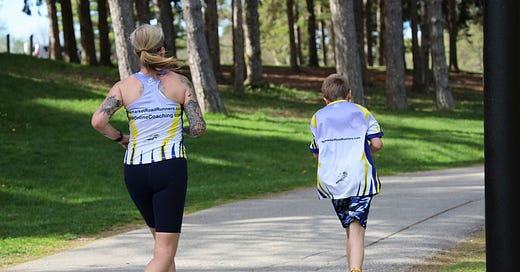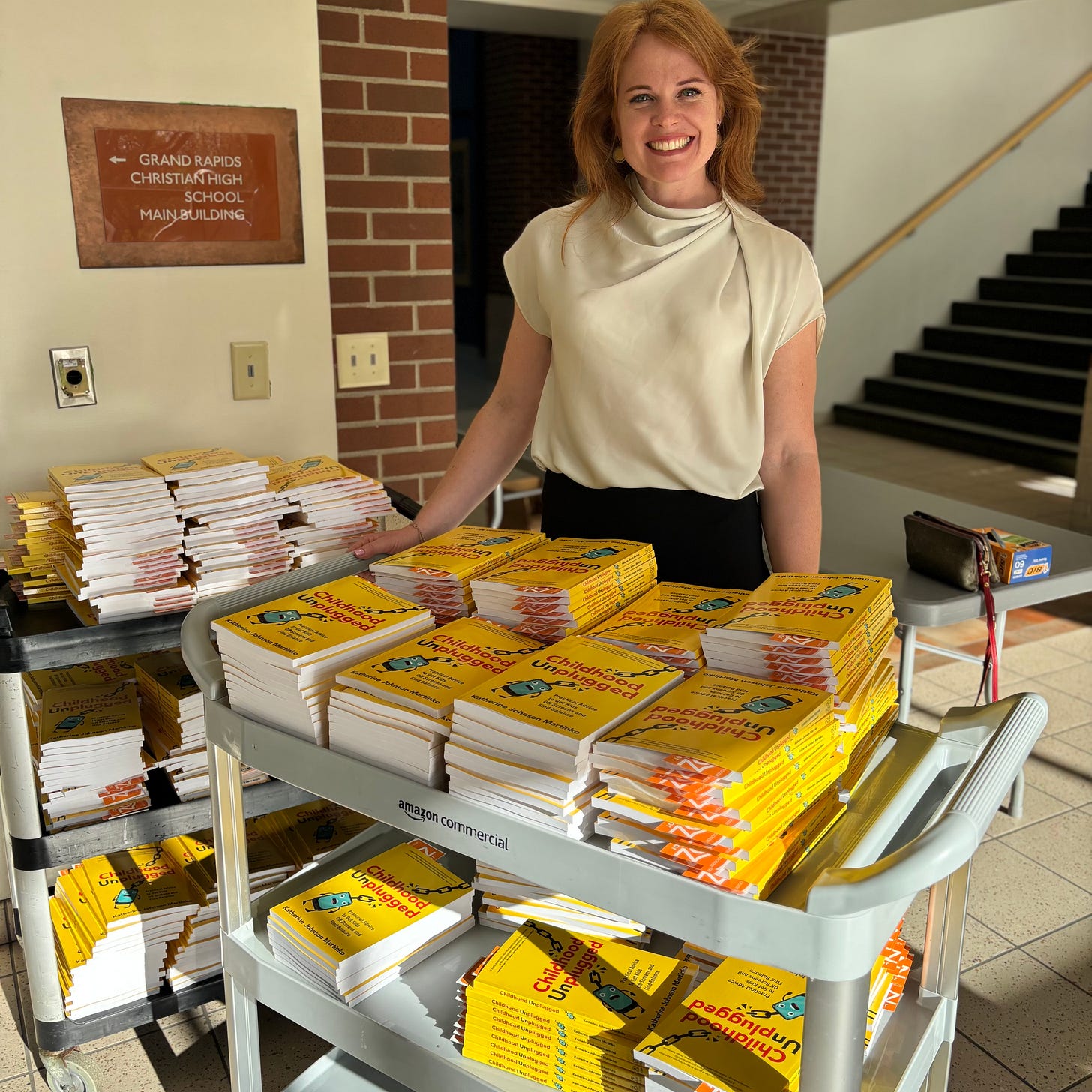There is a story in Julie Lythcott-Haims’ 2014 book, How to Raise an Adult, that I often think of. She describes a Seattle mother named Catharine Jacobsen, who once called her own mother to complain about being cold and wet while watching her child’s soccer game. Catharine’s mother was unsympathetic.
I have no idea why you’re standing out there. You aren’t showing your kids anything. If you want to show them that athletics are important, you should be going on a run yourself… Why don’t you go do some stuff of your own? That’s you getting a life. Your kids will observe that and think, ‘OK, that’s how you get a life.’ And they’ll want to go get one. But the way it is, they’re going to be 25 and think, ‘I never saw grown-ups living a life. I only saw them doing stuff for me, driving around, standing somewhere on a Saturday morning.’
It reminds me of a conversation I had years ago with an acquaintance who was unhappy with her weight. She wanted to get in shape, but was too busy driving her kids around to extracurricular sports to find time to work out. She said, “I don’t want them to look like me someday, so I prioritize their athletics over everything else.”
She asked me for advice. When I suggested that modeling a personal commitment to fitness might be more effective, not to mention make her feel better, she brushed it aside as a silly suggestion.
As parents, we are hardwired to tend to our children—their needs, desires, talents, and more. And it is our job to nurture, for a fleeting 18 or so years, while they are under our direct care. But it’s not our only job. Far too many parents, mothers in particular, neglect their own selves amid the chaos of child-rearing, pushing aside physical pursuits and social connection and even relaxation in a well-intentioned effort to be the best possible parent.
While our presence matters greatly—I do believe in quantity over quality when it comes to spending time with kids—it does not mean that we can neglect ourselves. Not only is it bad for us as individuals, who still need to feel like we’re enjoying life and pursuing things that matter to us, independent of our children (who will eventually leave us, if all goes according to plan), but we need to model the kind of life that we want our own kids to have someday. If they don’t see us showing them how it’s done, how will they learn?
Research shows that children view parents as their heroes and admire them more than any other adult figure in their lives. As Lythcott-Haims writes,
When they look up to us, can we be proud of what they see? Do we show them a harried, stress-out person who is constantly staring at a smartphone, tablet, or computer, and who seems to care only about whether homework has been completed, and grades and scores have been obtained, and the soccer carpool runs on time?
Or do we show up in their lives as a person who walks through the world feeling good about ourselves, doing work that plays to our strengths and resonates with our values, and who makes time for meaningful human connection with them and with others? Our kids notice everything we do and don’t do.
What Can Parents Do?
She offers several suggestions for helping parents to look after themselves—and become better parents in the process. First is discovering your passion and purpose, which cannot be your kid. This places them in the “very untenable and unhealthy role of trying to bring fulfillment to your life.” It’s important to figure out how and who you want to be in the world, and to prioritize its pursuit. This is not selfish!
Second, learn to say no. Avoid obligations that detract from the pursuit of your passion. You do not need to volunteer for every class trip or school fundraiser. Take the advice of sociologist Christine Carter, who says that, in order to live a happy life, we should spend 95% of our time on the five things that matter most to us.
See Related Post: Parents, It’s OK to Do Less
Next, prioritize your health and wellness. Don’t be like my acquaintance, who sacrifices her own health in hopes that it will set her kids on a healthier path. That’s not how it works!
Invest in your relationship with spouse and friends. A “capacity for empathic relationships,” according to psychiatrist George Vaillant, makes us feel good about ourselves. At the end of one’s life, personal relationships are what determine one’s sense of satisfaction. “Happiness equals love—full stop,” Vaillant says. So, don’t hold back that love. Find time for it, and let it flourish.
You may need to question your relationship with money, Lythcott-Haims says, to consider if wealth is the predominant value system you live by—and whether that’s the wisest choice, particularly if it undermines your family’s enjoyment of day-to-day life.
Lastly, she says to practice kindness and gratitude, and not to allow a frenetic schedule to prevent you from doing things for others and recognizing what others do for you. It may feel like it’s slowing you down, getting in the way of more important tasks that need to be done; but one study found that people who, for two weeks, jotted down things they were grateful for showed less stress and greater satisfaction with life, along with reduced headaches, congestion, stomach pain, coughs, and sore throats.
I would add, have fun! Catherine Price has a great book called The Power of Fun: How to Feel Alive Again, which emphasizes the importance of adults reclaiming a sense of playfulness in their lives. She says, “Not only will navigating your life on autopilot leave you with fewer memories, it will actually make time seem to speed up.” In order to feel like you’re squeezing more out of this beautiful fleeting life we have, mix in some unexpected activities, aka “pattern separation”, that will stand out from the daily grind and give you happiness-inducing memories.
This Relates to Screen Time
When parents model for their kids the value of doing things for themselves, it becomes a powerful tool in the fight against excessive screen time. Parents can make (and strive to enforce) all the screen time rules in the world, but unless they show their children that living an offline life is valuable and desirable, their words will have little effect.
Regular readers may be familiar with a phrase I love and use frequently: “Fix your analog life first.” We must assemble our offline, analog lives in such a way that they appeal to us (and the children who observe us) and fill the void that is left when we put down our devices. Otherwise, any efforts to curb device use will be futile; their siren song will be impossible to ignore.
I think, too, that a less harried parent feels less compelled to be on their device because they don’t feel as strong an urge to scroll to escape themselves. They’re firmly rooted in the present, content with what they’re doing, comfortable with periods of quiet relaxation and even occasional boredom.
If you want your child to love their life, then you must love your own.
P.S. Please let me know what you think of the audio versions of my articles. I’d appreciate some reader/listener feedback in comments below as to whether or not that’s a helpful feature.
You Might Also Enjoy:
Speaking News
I just returned last night from an exhilarating event in Grand Rapids, Michigan, where I spoke to over 1,000 people about how to get kids off screens, give them back their play-filled childhoods, and regain control over our time and attention. The crowd was lovely, engaged and energetic. Attendees gathered in breakout sessions after my talk, to discuss their own stories and strategies with other parents. There was a breakfast the following day with hosts and sponsors to discuss practical strategies for effecting change throughout the city’s chool communities.
It’s one thing to have a message that I believe in and keep pushing out into the world; but that requires an audience that is receptive, looking for guidance, ready to act, eager to implement changes. It’s incredibly gratifying when those two forces meet—when it feels like the seeds are falling on fertile ground at just the right time—and that happened in a particularly dramatic way in Grand Rapids this week. I am excited to see what the community achieves in coming months and years, and hope that others will follow their lead.
If you’re looking for a speaker, please reach out! I’m booking talks into the summer and fall. Officially, I’m a speaker on behalf of the Anxious Generation campaign, but I am also represented by the Harry Walker agency. You can also get in touch with me directly.







Love this, Katherine! My husband and I found mountain biking together in our local biking trails here in Utah, and I believe that it’s contributed to saving our marriage. We are in our mid-fifties and will be soon launching the last of our six children. We’ve found that this activity has all the things: time in nature, physical activity, novelty and adventure (no two rides are the same!), a little risk, and most importantly, time together. It’s what makes us feel like kids again, and our favorite motto has become: “A good day is only a bike ride away!”
🚴♀️🚴♂️
Preparing for parenthood has been my motivator to make a host of positive changes in my life. Switching to a flip phone has been one of them -- but also addressing long-ignored health issues, reconsidering my career, moving. I'm grateful to my future kid for the motivation!